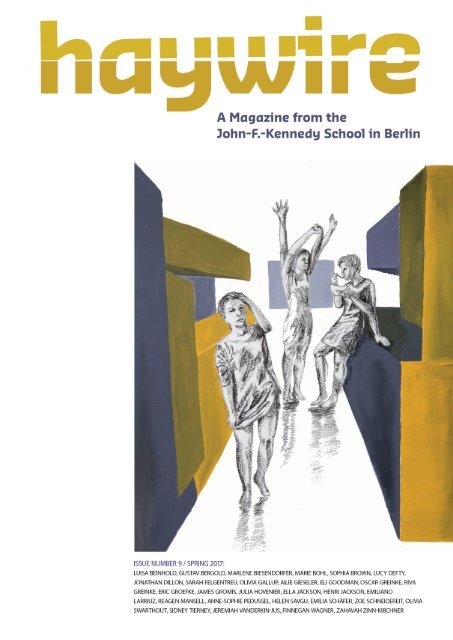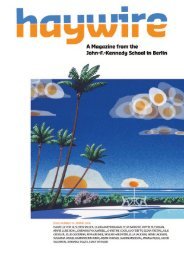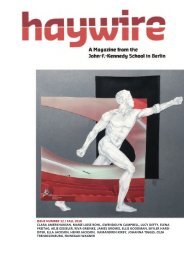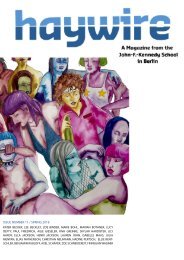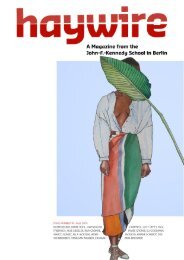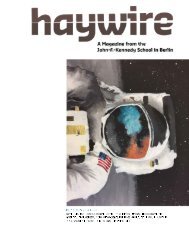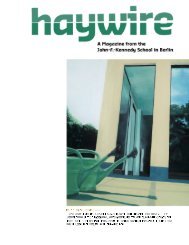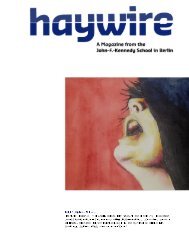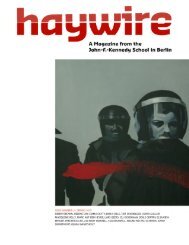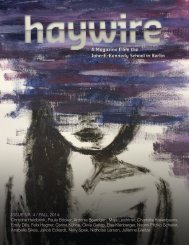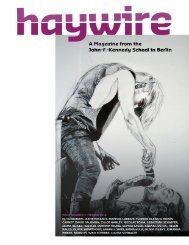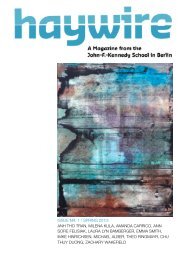HAYWIRE ISSUE 9 SPRING 2017
Literary art magazine from the John F. Kennedy School in Berlin
Literary art magazine from the John F. Kennedy School in Berlin
You also want an ePaper? Increase the reach of your titles
YUMPU automatically turns print PDFs into web optimized ePapers that Google loves.
CONTENTS<br />
PUBLISHER’S NOTE<br />
by Zahavah Zinn-Kirchner, 11a<br />
VIGNETTES<br />
The Negative Space by Anonymous<br />
The Youth by Eli Goodman, 10e<br />
Passionate Pitfall by Henri Jackson, 10c<br />
Tempting the Shadows by Sarah Felgentreu, 12a<br />
Wealth by Eli Goodman, 10e<br />
The End by Oskar Greinke, 12d<br />
POEMS<br />
by Various Authors<br />
ESSAYS<br />
“IT’S FRANKENSTEIN!”<br />
by Olivia Gallup, 12d<br />
LOSING, WINNING, AND SOMETHING INBETWEEN<br />
by Olivia Swarthout, 12d<br />
ART INTERVIEW WITH ZOE SCHNEIDEREIT<br />
WAS ZUR KUNST?<br />
by Ailie Gieseler, 10c<br />
SHORT STORIES<br />
RYU AND THE WOOD<br />
by James Gromis, 8d<br />
MURDER STORIES<br />
by Anne-Sophie Pedusse, 7f<br />
MASTHEAD
Publisher’s Note<br />
who have been inspired to capture the world<br />
around them and look within to create such beautiful<br />
writing, poetry and artwork, especially when<br />
it is not spring - especially when it’s cold outside<br />
and the city’s corners may<br />
<strong>HAYWIRE</strong> Issue 9 Spring <strong>2017</strong><br />
by Zahavah Zinn-Kirchner, 11a<br />
Even as this school year ends, there is<br />
nothing like spring to remind us of new beginnings.<br />
This season paints Berlin in every shade of<br />
green to soften the urban edges. Do we have time<br />
between classes to see the colorful<br />
purple lilacs, orange poppies,<br />
red clover or yellow dandelions<br />
showering over an old<br />
brick wall and sprinkled on the<br />
velvety grass or in the sidewalk<br />
cracks? Nature’s art reminds us<br />
of our own.<br />
We become distracted<br />
haywire |ˈhāˌwīr|<br />
adjective informal<br />
erratic; out of control :<br />
her imagination went haywire.<br />
ORIGIN early 20th<br />
century (originally U.S.):<br />
from HAY + WIRE, , from the<br />
use of hay-baling wire in<br />
makeshift repairs.<br />
seem frozen and sharp.<br />
This past academic year<br />
has not left us untouched as<br />
a planet. We are spinning<br />
more wildly and uncontrollably<br />
in negative social, economic,<br />
and political directions<br />
than ever before.<br />
from the “have to do this” mentality to looking<br />
at the stunning world around us. We have learned<br />
from Shakespeare how roses inspire poetry. When<br />
we smell the flowers in spring, we may want to<br />
write our own song.<br />
This last year I have been privileged to be<br />
an editor of this blooming project of creativity<br />
Art is a powerful vehicle that can help us<br />
articulate new visions for our society. People have<br />
often turned to the arts to express themselves,<br />
hoping to find some higher truth or understanding,<br />
perhaps a solution to heal the earth - hopefully to<br />
appreciate and honor all its creation.<br />
We invite you to join us on our journey…<br />
called “Haywire”. I am in awe of my classmates<br />
3
<strong>HAYWIRE</strong> Issue 9 Spring <strong>2017</strong><br />
Negative Space<br />
/ˈnɛɡətɪv/ /speɪs/<br />
may become most evident when the space<br />
around a subject, not the subject itself, forms an<br />
interesting or artistically relevant shape<br />
Negative Space<br />
by Anonymous<br />
The first thing my uncle taught me when he<br />
looked at my colourful doodles is that mathematical<br />
shapes compose each of our bodies,<br />
whether they produce exquisitely smooth corpses<br />
or torsos as rough as sandpaper.<br />
But I look at all the trapezoids, spheres and<br />
irregular quadrilaterals jutting from the cylinder<br />
of my spinal chord and only the negative space<br />
springs out at me.<br />
4
All all those patterns I am not, and all the air I<br />
avoid breathing.<br />
They told me to fold in my edges and form the<br />
most pleasingly pretty shape that could be hung<br />
up as a geometrical catastrophe of a trophy.<br />
I’m exhausted from shimmering in the shape of<br />
shattered glass though. All the diamond shaped<br />
edges just shredded those soft dreams covering<br />
the architecture of lines that makes up the form<br />
I inhabit.<br />
<strong>HAYWIRE</strong> Issue 9 Spring <strong>2017</strong><br />
So I collapse into a vacuum of empty space<br />
and give up the symmetry of a linear world.<br />
Art by Ailie Gieseler, 10c<br />
5
Photo by<br />
Lucy Defty, 10a<br />
<strong>HAYWIRE</strong> Issue 9 Spring <strong>2017</strong><br />
The Youth<br />
by Eli Goodman, 10e<br />
It is the year 20XX and there is this<br />
trendy new “all human” restaurant in town.<br />
Everyone is talking about how it promises to<br />
exclusively hire humans to serve its customers;<br />
Robots have been around long enough now<br />
to make this a novel idea. An article is written<br />
about it: “How Can Small Business ‘Home<br />
Grown Human’ Expect to Stay in Business<br />
with its All Human Staff?”. People joke about<br />
how awkward it must be to have to order from<br />
someone instead of something, and the phrase<br />
“meat serving meat” jumps around the internet.<br />
A video calculating how many calories must be<br />
spent distributing calories is made, and the results<br />
are shocking! Finally the restaurant actually<br />
opens and you decide to give it a try, ‘cause<br />
why not? You walk in and see that every single<br />
waiter sitting at a table with the customers, each<br />
having a nice little conversation in turn. All the<br />
servers are really doing to make them stand out<br />
from the customers is filling empty glasses and<br />
disappearing to the kitchen to fetch food every<br />
now and then. One server accidentally knocks<br />
over a glass and you hear, “don’t worry about it,<br />
you’re only human”, and the whole table erupts<br />
with laughter. You still remember the 2010s;<br />
service wasn’t like this back then, you can’t<br />
quite place what’s wrong. They are treating the<br />
service like humans.<br />
6
The first thing I heard when we moved<br />
into the new house was a bang, then a crash,<br />
then a splat. Slowly however it became a<br />
steady, contagious beat. My neighbor started<br />
playing the drums when he was four and<br />
has never stopped since. Some people think<br />
he is erratic, obsessed, a ship capsized in the<br />
depths of his own mind. In concert band he<br />
detonates the bass drum with all his fortitude<br />
and you can tell he wishes to play louder. He<br />
walks through the halls playing air drums or<br />
even hitting objects with his sticks, transferring<br />
the rhythm of his life and his passion onto<br />
everything he touches. When you’re around<br />
him, you even feel your own heart pulsating<br />
clamorously and maybe that is why people are<br />
Passionate Pitfall<br />
by Henri Jackson, 10c<br />
intimidated. I’m not though. In fact, I applaud<br />
him. Having something he loves. A drive that<br />
forces him forward, while keeping him rooted,<br />
balanced and steady. Other people deride and<br />
demur him for not being “normal”. Those people<br />
however go home, twiddle their thumbs,<br />
and gawk into the vast sky. He reminds me<br />
of an ocean, perhaps ever raging and wild,<br />
but always active, moving, never resting. Let<br />
others criticize, but they are the ones who unknowingly<br />
spend their lives in front of phones,<br />
stare at the blank page of their writing prompt,<br />
subconsciously twiddling, rolling, drumming<br />
their fingers rhythmically on the table in boredom,<br />
perhaps however secretly searching for<br />
inspiration.<br />
<strong>HAYWIRE</strong> Issue 9 Spring <strong>2017</strong><br />
Art by Lucy Defty, 10a<br />
7
Tempting the Shadows<br />
by Sarah Felgentreu, 12a<br />
<strong>HAYWIRE</strong> Issue 9 Spring <strong>2017</strong><br />
The precious twinkle falls precipitously, leaving<br />
a hint of glittering sparkle in the dull yet saturated<br />
air. Sunlight causes the infinitesimal flicker to reflect<br />
itself, blending the bystanding shadows that cloak<br />
themselves in unwillingness. It tenaciously rolls<br />
through endless mountains of shattered stones that<br />
split the dusted and lonesome landscape. Scattered<br />
around lay foreign forms that oftentimes defy the naturality<br />
of life. And the golden shimmer continues rolling<br />
forward in its own steady and balanced rhythm and<br />
cautiously avoids being brought to halt. It goes on and<br />
on and on like the beating of a child´s heart that still relies<br />
on the world´s naivete. Tired but still curious eyes<br />
follow that glinting shine, tentatively absorbing the<br />
scene out of the immunity of the shadows, reminiscing<br />
about the obsolete feeling of potential attentiveness<br />
and empathy. However, no movement, neither<br />
lethargic nor potently active, occurs as the world is<br />
not only naive but separated. Then a rain of gold outpours,<br />
drips and drizzles in the elusive air, generating<br />
a scintillating glint that morphs into a solid, impenetrable<br />
cloud of opportunity. A startling shift causes the<br />
shadows to tremble and the whispers and murmurs<br />
merge with the obscure and stirring surroundings and<br />
ultimately become louder, Louder and LOUDER until<br />
every expression, every word that has been recently<br />
repressed frees itself from the shadowy lips to create<br />
a golden tune that floats round and round. And the<br />
sun, being the only legitimate witness, as its rays endlessly<br />
soothe its recipients like a lullaby, highlights<br />
the glimmering sparkles that soon vanish, one by<br />
one, grasped by the fathomless dusk of the shadows.<br />
Art by Jonathan Dillon, 12d<br />
8
Wealth<br />
by Eli Goodman, 10e<br />
It is the year 20XX and the rich have it feels like to be poor, to work at a mine, to<br />
gotten so tired of everything that their newest be pushed into the dirt. Soon the working class<br />
entertainment is the simplest sensations. They labels this as “gluttonous experientialism”, because<br />
their lives are being treated like a leisurely<br />
move through museums enjoying exhibits such<br />
as the feeling of a squid’s skin, or a room where dream that you can easily wake up from. Some<br />
they stare at a white wall for half an hour, so they of the upper class who don’t want to be seen<br />
can know what it feels like to do so. One exhibit as ignorant shun this practice and never return,<br />
promises “a fun night of watching paint dry” in but still the fad persists and the richest of the<br />
colorful letters. Another is simply labeled “Liquids”.<br />
Later the rich start paying to know what something to be collected, and not to be<br />
rich start collecting experiences, as if life was<br />
lived.<br />
<strong>HAYWIRE</strong> Issue 9 Spring <strong>2017</strong><br />
9
<strong>HAYWIRE</strong> Issue 9 Spring <strong>2017</strong><br />
The End<br />
by Oskar Greinke, 12d<br />
Photo by Luisa Beinhold, 12a<br />
10<br />
When the nuclear holocaust came, it<br />
wasn’t started by the USA or Russia. It wasn’t<br />
North Korea or Iran. It wasn’t the epic conclusion<br />
to some destructive global conflict. There<br />
hadn’t even been much global conflict for decades.<br />
With the political pendulum swinging<br />
back and forth, the tensions between Russia<br />
and the US, the Middle East and the European<br />
Union were dying down. Living standards were<br />
rising, people were prospering. The nations of<br />
Europe had unified into a single powerful nation-state.<br />
So when the nuclear holocaust came,<br />
it wasn’t the epic conclusion to a struggle for<br />
resources, nor was it the result of a territorial<br />
dispute gone horribly wrong. In the end, it came<br />
during a routine maintenance check of the missile<br />
systems. An engineer slipped and spilled<br />
his coffee on some archaic control panel. While<br />
grumbling about how he’d have to report this to<br />
his superior and waste so much time writing a<br />
report, he caused a small, barely annoying static<br />
spark, prompting a chain reaction that launched<br />
the missile without any sort of authorization<br />
whatsoever. In the end, coffee killed everything<br />
on the planet, down to the cockroaches.
How I See The World<br />
Poems by Helen Savgu, 8c<br />
Like camera shades my eyelids roll open.<br />
Like lenses my eyes adjust to the white lights.<br />
Like a black and white movie, I see the world in<br />
front of me.<br />
Photo by Sidney<br />
Tierney, 12d<br />
<strong>HAYWIRE</strong> Issue 9 Spring <strong>2017</strong><br />
“Why is the sky grey? “<br />
I asked my mother.<br />
Like someone pressed the black and white button<br />
in the settings.<br />
Like all color was erased from my screen.<br />
“The sky isn`t grey, my son. It is the color of the<br />
ocean…”<br />
Blue<br />
Staring at the ocean.<br />
Forcing my eyes to see this thing called blue.<br />
Trying too hard and slowly my battery runs out.<br />
The world fades in front of me as my lenses start to<br />
close.<br />
11
<strong>HAYWIRE</strong> Issue 9 Spring <strong>2017</strong><br />
Twins<br />
by Marie Bohl, 10d<br />
One they would not win<br />
And many others joined in<br />
Of all, they lost the most<br />
Because the others were brutal<br />
And they had many foes<br />
This brought them fury<br />
Like hell from above<br />
They began with pain<br />
And withdrew their love<br />
A second war started<br />
A bigger one yet<br />
Everything went tumbling over their heads<br />
And they committed unforgivable acts<br />
Then at last<br />
It was over<br />
But not yet past<br />
Art by Zoe Schneidereit, 11d<br />
Once upon a time<br />
There existed two twins<br />
Exactly the same<br />
With a beautiful laugh<br />
And a smile to frame<br />
With the same resilience as we will see<br />
They loved each other in their hearts<br />
They kept each other from falling apart<br />
They were mirrors<br />
Merely reflections of themselves<br />
Repeated back again<br />
They were interesting<br />
And once upon a time<br />
They withdrew from resting<br />
They started a war<br />
Some darkness remained<br />
But most was now gone<br />
The others proposed arranged marriages<br />
And because they had suffered defeat<br />
They agreed<br />
The first twin married her suitor<br />
See she only had one<br />
And this one suitor moved into her home<br />
Kept her separate and alone<br />
The other twin was courted by three<br />
They too came to live in his home<br />
Yet ended up cut off by stone<br />
The suitor who was one<br />
Began to influence the first twin<br />
Began to alter her once strong beliefs<br />
Her own views flowing just out of sight<br />
Of course some doubt remained<br />
But only in shadows never in light<br />
The suitors that were three showed the second<br />
twin a whole new sea<br />
A broader horizon<br />
And his life began to change<br />
12
The twins stopped talking<br />
Stopped caring<br />
Stopped<br />
Being<br />
One<br />
No longer united<br />
Their hearts and homes divided<br />
One day-<br />
They wished deep down<br />
One day we'll be together again<br />
Even after the suitor departed her home<br />
The first twin was still in love<br />
And still alone<br />
Still shared his ideals and policies<br />
Even after the three courtiers changed their minds<br />
And left the second twin behind<br />
He was altered<br />
Though blood is what they shared<br />
They could not see eye to eye<br />
They simply would not agree<br />
So bit by bit she started a revolution<br />
Without raising a fist<br />
Because this was to be done right<br />
Not out of spite<br />
For no more wars<br />
Never again<br />
And then she left<br />
The false love begone<br />
He thought he got away with theft<br />
But he'd been wrong<br />
And after a while<br />
The second twin came by<br />
And asked the first twin<br />
To move back in<br />
After all this time<br />
They were one and the same<br />
And so forever they shall remain<br />
These twins are our home<br />
If you know what I mean<br />
Denn dies ist unsere Heimat<br />
So wie es schien<br />
<strong>HAYWIRE</strong> Issue 9 Spring <strong>2017</strong><br />
And one day<br />
She said<br />
And this hurt him to the core<br />
We shall be separated forever<br />
We are twins no more<br />
It was not what the first twin wanted<br />
Deep in that heart that they still shared<br />
It was not right<br />
But this twin was scared<br />
And after a while she started to rebel against the<br />
suitor that was one<br />
For their love was untrue<br />
And it was a fight to be won<br />
13
<strong>HAYWIRE</strong> Issue 9 Spring <strong>2017</strong><br />
Ablaze<br />
by Lucy Defty, 10a<br />
From the fire of the sun,<br />
The hearth of the Universe<br />
A ray of light was born.<br />
Thrust from its mother's womb<br />
Into the cold darkness beyond<br />
a spear in the dark it travelled on.<br />
It gazed upon Orion's bow,<br />
his belt where stars are born<br />
The furnace of creations far gone.<br />
It evaded the planets<br />
Engaged in an everlasting walz<br />
Yet never to feel another's warmth.<br />
Never resting, single-minded in its<br />
purpose<br />
It travelled 90,000,000 miles<br />
Until it met you.<br />
So your skin could turn golden.<br />
Invincible.<br />
So you can leave a shadow in your<br />
wake.<br />
Photo by Ella<br />
Jackson, 8c<br />
Yo<br />
by Zahavah Zinn-Kirchner, 11a<br />
yo soy la chica<br />
que se levanta temprano<br />
y que se despierta tarde<br />
que trabaja con toda su fortaleza<br />
que ama a la naturaleza<br />
y que intenta de ayudar a personas<br />
yo soy el día que nunca va a regresar<br />
yo soy la nota que nunca voy a tocar<br />
yo soy el futuro que nadie va a conocer<br />
yo soy todo lo que quiero, lo que tengo que<br />
tener<br />
yo consiste en cajas envueltas de otras<br />
que contienen secretos y preguntas<br />
innumerables - tan locas y que están temblando<br />
que están en parte silenciosas y en parte<br />
aullando<br />
buscando todas la respuesta a la pregunta<br />
eterna<br />
de<br />
¿quién eres tú?<br />
14
Quetzalcoatl is Born<br />
by Olivia Swarthout, 12d<br />
There are crows in all the cherry trees and<br />
no fruit on the<br />
branches I am<br />
ready I am<br />
ready I<br />
will have to take my chances I am<br />
maybe not myself,<br />
you see, but<br />
then - guess I don’t have to be -<br />
why should I have to spring forth - like<br />
Athena, fully formed?<br />
I will claw myself out - still<br />
red-skinned,<br />
still red-eyed but ready<br />
<strong>HAYWIRE</strong> Issue 9 Spring <strong>2017</strong><br />
Art by Jeremiah<br />
Vanderkin-Jus,<br />
12d<br />
15
<strong>HAYWIRE</strong> Issue 9 Spring <strong>2017</strong><br />
Proslava<br />
by Emiliano Larriuz, 12d<br />
A bright flash. I’m forced backward<br />
by a wave of pressure.<br />
Deafening sounds echo through<br />
my world.<br />
Body parts flailing. Flying through<br />
the air, untethered from constraints<br />
present just moments earlier.<br />
No sounds reach my ears, just<br />
a constant ringing.<br />
The colors, as a burning fire, the mass<br />
of bodies writhing.<br />
Whether pleasure or<br />
pain, I don’t know.<br />
Art by Marlene<br />
Biesendorfer,<br />
11d<br />
16
Art by Ailie<br />
Gieseler, 10c<br />
<strong>HAYWIRE</strong> Issue 9 Spring <strong>2017</strong><br />
It fades. It all fades.<br />
Peace. The fire dies.<br />
The world brightens, a saxophone<br />
melody floats through the air.<br />
A beat. A rhythm returns, like<br />
a reanimated heart.<br />
Everything comes<br />
crashing in around me.<br />
Pain.<br />
Pleasure.<br />
I am alive!<br />
17
<strong>HAYWIRE</strong> Issue 9 Spring <strong>2017</strong><br />
Photography by<br />
Zahavah Zinn-<br />
Kirchner, 10<br />
Poem by Sophia<br />
Brown, 12d<br />
18
<strong>HAYWIRE</strong> Issue 9 Spring <strong>2017</strong><br />
Poem by Olivia<br />
Gallup, 12d<br />
Art by Julia<br />
Hovenier, 11d<br />
19
<strong>HAYWIRE</strong> Issue 9 Spring <strong>2017</strong><br />
20<br />
doom and gaiety.<br />
“It’s Frankenstein!”<br />
by Olivia Gallup, 12d<br />
In a time when flowery<br />
Romanticism bloomed, a fascination<br />
with the dark and demonic<br />
sprouted into gothic literature.<br />
The natural and beautiful<br />
is juxtaposed with the nightmarish<br />
and grotesque throughout<br />
the 19th century,<br />
with sickly images of horror and<br />
disgust. “...for I was lifeless, and<br />
did not recover my senses for a<br />
long, long time” (62). The abject<br />
horror poisoned his taste for scientific<br />
advancement and made<br />
him unable to revive his interests<br />
is capped off in the death of his<br />
beloved fiancée Elizabeth. “What<br />
then became of me? I know not;<br />
I lost sensation, and chains and<br />
darkness were the only objects<br />
that pressed upon me” (202). The<br />
potential of his future was decimated,<br />
the rest of his life<br />
culminating in<br />
devoted to futile revenge.<br />
Mary Shelley’s<br />
While too much gothicism<br />
1831 epistolary<br />
causes impairment,<br />
novel Frankenstein.<br />
too much rosiness puts<br />
The titular<br />
Frankenstein into kind<br />
character Victor<br />
of ecstatic stupor. He<br />
Frankenstein himself<br />
is caught in<br />
between the struggling<br />
finds only fleeting and<br />
deceiving rejuvenation in<br />
nature and friends after<br />
forces of<br />
his creation. “...I<br />
became<br />
Photo by Jeremiah Vanderkin-Jus, 12d<br />
His productivity relies on a precarious<br />
balance of the Gothic Frankenstein from his studies<br />
fully. A second bout of grief tears<br />
and Romantic for optimal function,<br />
failing in time colored by voyage on a stormy night-time<br />
when his brother is murdered, to<br />
pronounced darkness and stagnating<br />
in times excess comfort. appeared a vast and dim scene<br />
journey to Geneva. “The picture<br />
Every touch of the unnatural<br />
and moral plunge Franken-<br />
that I was destined to become the<br />
of evil, and I foresaw obscurely<br />
stein further down a pit of despair, most wretched of human beings”<br />
during which he loses his capacity<br />
for productivity. Following the foreshadows further gloom and<br />
(76). The death of his brother<br />
masterpiece creation of the monster,<br />
Frankenstein is confined Victor useless. Indeed, the dreary<br />
soul-sucking misery that renders<br />
with a nervous fever, imbued and terrible in Frankenstein’s life<br />
the same happy creature<br />
who, a few years ago, loved and<br />
beloved by all, had no sorrow or<br />
care” (71). Despite rejuvenating<br />
him, the positivity around Frankenstein<br />
blinds him and blocks<br />
all thought pertaining to innovation<br />
and to the monster. However,<br />
his guilt about the death of Justine<br />
rendered even the rejuvenating<br />
quality of his wallows in comfort<br />
pointless. “Thus not the tenderness<br />
of friendship, nor the beauty<br />
of earth, nor of heaven, could redeem<br />
my soul from woe: the very
accents of love were ineffectual”<br />
(96). The formerly restoring effect<br />
peace and affection had on<br />
Frankenstein’s psyche give way<br />
and his clashes with romanticism<br />
precipitate nothing but purposelessness.<br />
Frankenstein even allows<br />
his environment to distract<br />
him from appeasing the monster<br />
of despair [...], but there was an<br />
air of dignity and beauty, that<br />
hardly permitted the sentiment<br />
of pity” (79). His admiration<br />
for the picture is reflected in the<br />
nature scenes Shelley describes<br />
that he is most partial to. “The<br />
abrupt sides of vast mountains<br />
were before me; the icy wall of<br />
scraggy limbs gave token of their<br />
miserable fare” (168). Only with<br />
a satisfactory amount of darkness<br />
and misery does Victor manage<br />
to resume his work and achieve<br />
some measurable amount of<br />
progress on solving his problems.<br />
Life cannot be all sunshine<br />
and rainbows to have pur-<br />
<strong>HAYWIRE</strong> Issue 9 Spring <strong>2017</strong><br />
that made his life misery in the<br />
the glacier overhung me; a few<br />
pose, and without the comple-<br />
first place. “I had now neglected<br />
shattered pines were scattered<br />
mentary doom and wretchedness,<br />
my promise for some time, and<br />
around; the solemn silence of this<br />
Frankenstein loses perspective<br />
I feared the effects of the dae-<br />
glorious presence-chamber of<br />
and allows distraction to keep him<br />
mon’s disappointment” (167).<br />
imperial Nature was broken only<br />
from his goals. Grief spirals him<br />
The beautiful, nostalgia-inducing<br />
by the brawling waves or the fall<br />
down a path towards revenge and<br />
scenery Henry and Victor travel<br />
of some vast fragment…” (99).<br />
self-destruction, while elusive joy<br />
past on their quest for information<br />
The awful and majestic in na-<br />
fools him into believing in free-<br />
again distracts Frankenstein from<br />
ture recalibrates Victor and gives<br />
dom from his curse. One of the<br />
productivity and logical courses<br />
him direction again; he meets his<br />
greatest potential scientists of his<br />
of action. Paradoxically, it is in<br />
creation in a similar setting and<br />
time, who could have flourished<br />
states of peak wellbeing that Vic-<br />
agrees to create a mate for him.<br />
had it not been for his abhorrent<br />
tor allows his fear to master him.<br />
This promise remains unfulfilled<br />
creation, Frankenstein seems to<br />
It takes a certain amount<br />
in the majestic scenery until Vic-<br />
pull the most constructive ener-<br />
of Gothicism for Victor to rise<br />
tor finds a suitably Gothic work-<br />
gy in times of balanced darkness<br />
above and master his situation.<br />
station for use as a laboratory.<br />
and light. Mary Shelley criticizes<br />
A painting at his father’s house<br />
“The soil was barren, scarcely<br />
both extremes for their dumbing<br />
stands out to him due to its per-<br />
affording pasture for a few mis-<br />
effects and reminds readers that<br />
fect unity of Gothic and Roman-<br />
erable cows, and oatmeal for its<br />
maintaining contact with both<br />
tic qualities. “It [...] represented<br />
inhabitants, which consisted of<br />
is central to leading a self-sat-<br />
Caroline Beaufort in an agony<br />
five persons, whose gaunt and<br />
isfying and meaningful life.<br />
21
Losing, Winning, and Something Inbetween<br />
by Olivia Swarthout, 12d<br />
<strong>HAYWIRE</strong> Issue 9 Spring <strong>2017</strong><br />
Tim O’Brien’s novel<br />
Going After Cacciato follows a<br />
group of soldiers through their<br />
personal conflicts in the Vietnam<br />
War, very few of which relate<br />
directly to the motivations<br />
of the war itself. The men are<br />
not occupied with the politics<br />
of why they are fighting through<br />
vast tracts of foreign, hostile<br />
land. In fact, what one might call<br />
the “bigger picture” has little to<br />
do with how each man rationalizes<br />
his predicament to himself<br />
- smaller, more personal goals<br />
play a much more central role in<br />
how they approach their struggles.<br />
This is not, however, to say<br />
that the personal ambitions of<br />
the soldiers are any more tangible<br />
or objective than those of the<br />
Vietnam War at large. The men<br />
featured in Going After Cacciato<br />
must face their own internal<br />
dilemmas of identity and ideology,<br />
all the while dealing with<br />
the perils and threats of fighting<br />
Photos by Eric<br />
Groefke, 12a<br />
their way through miles of dense<br />
jungle, death all around and<br />
within their squad. Though Spec<br />
Four Paul Berlin claims himself<br />
unable to coalesce his thoughts<br />
and wishes into tangible goals<br />
outside of “staying alive long<br />
enough to find goals worth living<br />
for,” over the course of the<br />
story O’Brien lays bare a deep<br />
set of conflicting desires within<br />
Paul Berlin; he wants to remain<br />
detached from the war yet has<br />
no way around the atrocities he<br />
must commit, and his yearning<br />
for a stable, conventional life<br />
contravenes his compulsion<br />
to carry through with his duty.<br />
When a fellow soldier, Cacciato,<br />
deserts the squad, Paul Berlin<br />
must confront the mutually<br />
exclusive nature of many of his<br />
desires. Upon ultimately choosing<br />
duty over desertion when<br />
he kills Cacciato, Paul Berlin<br />
embarks on an elaborate daydream<br />
of instead chasing Cac-<br />
ciato through all of Asia and Europe,<br />
westward toward Paris, the<br />
unimaginably distant city of lights.<br />
Though having fulfilled his role as a<br />
soldier doesn’t entirely instill Paul<br />
Berlin with the sense of triumph he<br />
seeks from the War, in creating a<br />
surrogate reality for his unfulfilled<br />
dreams, Paul Berlin is able to, briefly,<br />
seize the unattainable triumph<br />
incongruous with the practical decisions<br />
he feels must make, granting<br />
himself the victory he wishes<br />
for so badly, alongside the victory<br />
of staying alive through the war.<br />
Paul Berlin is fundamentally<br />
different from the soldiers he<br />
fights alongside - over and over he<br />
tells himself that he is detached<br />
from his comrades and the fighting,<br />
through the steamy jungles<br />
and sun-baked fields. Perhaps it is<br />
the only way for “Paul Berlin, who<br />
had no desire to confront death until<br />
he was old and feeble” (167) to<br />
keep hold of his life and sanity in<br />
the war, as from the beginning we<br />
see that he is engaged not only in<br />
a physical but also a deep mental<br />
struggle for his identity, as he is<br />
disgusted by the senseless violence<br />
of the war but cannot bring himself<br />
to speak up or break free. As<br />
a form of escapism, he repeatedly<br />
envisions himself explaining to his<br />
friends and family back home how<br />
he was able to remain detached<br />
from the atrocities, imagining himself<br />
separate from the soldiers who<br />
have surrendered themselves to the<br />
pushes and pulls of the the tides<br />
of war. In Paul Berlin’s mind, “He<br />
would adjust. He would play the<br />
22
<strong>HAYWIRE</strong> Issue 9 Spring <strong>2017</strong><br />
part. But he would not join them.”<br />
(210) Though it is not at first<br />
made evident that Paul Berlin<br />
has fabricated the pursuit of Cacciato<br />
in his mind, one sees many<br />
situations in Vietnam with which<br />
he copes using such flights of<br />
fancy, foreshadowing the revelation<br />
that the practically the entire<br />
narrative is one such daydream.<br />
A proclivity for getting<br />
lost in his head, however, doesn’t<br />
mean that Paul Berlin’s actions<br />
diverge from the other soldiers<br />
as much as his mind does. He<br />
still carries with him the guilt<br />
and scars from the violence he<br />
is surrounded by and takes part<br />
in. Though he wishes to tell the<br />
Art by Violeta<br />
Jannis 12d<br />
villagers that “he wanted to harm<br />
no one,” that “he was innocent,”<br />
(263) of course as a soldier Paul<br />
Berlin lacks the means to reconcile<br />
the actions of the military<br />
with his own morals. The suppressed<br />
remorse over an injured<br />
Vietnamese girl “with gold hoops<br />
in her ears” and the idea that she<br />
cannot somehow “separate him<br />
from the war,” see him for who<br />
he truly is—”just a scared-silly<br />
boy from Iowa” (262) surfaces<br />
in Paul Berlin’s fantasy as Sarkin<br />
Aung Wan, a mysterious young<br />
girl with similar “gold hoops<br />
through her ears” (51). Though<br />
he is not able to save the real girl,<br />
or any of the other villagers, he<br />
imagines bringing Sarkin Aung<br />
Wan to Paris with him, saving<br />
her from war-torn Vietnam and<br />
fulfilling her dream of visiting<br />
the city of lights. As such— despite<br />
reality often intruding on<br />
his daydreams, as they are interspersed<br />
with scenes of real-life<br />
death and carnage that interrupt<br />
the phantasmagoric journey<br />
through Asia and Europe—Paul<br />
Berlin’s figmental version of<br />
himself is free of the burdens of<br />
war and guilt, both mentally and<br />
physically, “no helmet crushing<br />
his skull, no rucksack or armored<br />
vest,” (115) to weigh him down.<br />
Although one soldier<br />
fewer, Paul Berlin’s squad ends<br />
the novel more or less where they<br />
started—in Vietnam, miserable,<br />
with no end in sight, not very<br />
23
<strong>HAYWIRE</strong> Issue 9 Spring <strong>2017</strong><br />
much time having elapsed over<br />
the course of the whole story. Yet<br />
Paul Berlin, despite having killed<br />
Cacciato, is still alive, still sane<br />
and able to fight, still able to do his<br />
duty. His fantasy has dissolved in<br />
the morning light, and although<br />
its final scene in the conference<br />
hall with Sarkin Aung Wan belies<br />
Paul Berlin’s inner conflict over<br />
remaining in the war, he resolves<br />
that he would not be able to find<br />
any greater measure of peace in<br />
running away than he would in<br />
fighting. More so than feeling<br />
obligated to fight for duty’s sake,<br />
Paul Berlin is “afraid of running<br />
away”. He fears “what might be<br />
thought of [him] by those [he<br />
loves]”, “being an outcast,” “being<br />
thought of as a coward”. (320)<br />
Rather than feel guilty over these<br />
fears, he accepts that if there is<br />
no way around them, he will not<br />
find fulfillment in trying to defy<br />
them when. If Paul Berlin is right<br />
in believing that “peace of mind<br />
is not a simple matter of pursuing<br />
one’s own pleasure,” and that he<br />
can better serve himself by giving<br />
way to these worries, then the<br />
book ends with triumph for Paul<br />
Berlin. Has he not succeeded in<br />
overcoming the compulsion to irresponsibly<br />
chase Cacciato, a different<br />
life, that far-off pleasure?<br />
Has he not, through the power of<br />
daydreams, made one more step<br />
toward living “long enough to<br />
establish goals worth living for<br />
still longer?” (26). Though many<br />
characters encountered along the<br />
fictitious way, from Sarkin Aung<br />
Wan to the college dropout girl<br />
define triumph in starkly different<br />
terms than does Paul Berlin,<br />
if victory in his eyes is staying<br />
alive, staying sane, and making<br />
his father and hometown proud,<br />
then Going After Cacciato does<br />
nothing from beginning to end<br />
but recount the measures Paul<br />
Berlin takes toward those ends.<br />
All those who read Going<br />
After Cacciato may have different<br />
ideas of what victory entails,<br />
especially within the context of<br />
the highly controversial Vietnam<br />
War. But although the feeling<br />
may be more bitter than sweet<br />
when reality comes crashing<br />
back down around Paul Berlin at<br />
the end of the story, the undeniable<br />
truth is that for this soldier,<br />
there can be no pursuit of dreams<br />
of desertion, as Sarkin Aung Wan<br />
would have liked, or rebellion<br />
against some higher power, a<br />
grand ideological statement as the<br />
girl whose van they stole thought<br />
was the case. Paul Berlin will remain<br />
a soldier, and do his duty.<br />
Yet in dreaming of breaking free,<br />
heading west, leaving the weight<br />
of the helmet and rucksack and<br />
armored vest behind, Paul Berlin<br />
can briefly achieve that distant,<br />
impossible sense of victory, all<br />
the while bringing himself, step<br />
by heavy step, closer to his release<br />
from the war. One day, Paul<br />
Berlin will truly be victorious.<br />
Photo by Eric<br />
Groefke, 12a<br />
24
<strong>HAYWIRE</strong>: What is your creative process?<br />
Zoe: So typically I work from images, so I’ll<br />
see something that I like, whether it be fashion<br />
related or just art itself, for example for<br />
this one piece ‘The Red Room’, the woman on<br />
the left with the overdrawn lips and the messy<br />
bob hair was inspired by a photograph I saw<br />
by Parker Day. There was just an essence to<br />
this character that I really liked and tried to<br />
recreate. That happens a lot, where I’ll see<br />
an element to something that I want to recreate.<br />
I'll take the image, switch it around, add<br />
things to it and then that’s how it typically goes.<br />
<strong>HAYWIRE</strong>: What do you draw inspiration from?<br />
Zoe: Recently I’ve been interested in kitschy<br />
stuff… so like 50s gaudy, gross, colourful<br />
things, which I actually hate, but I want to draw<br />
it; it’s very strange. When I see it I’m like ‘that’s<br />
disgusting’, but I want to draw it - it’s so intriguing.<br />
It creates an emotion, and in a way that’s<br />
what people want to go for. You want your audience<br />
to feel something. In my case I try to evoke<br />
disgust, or go into the melancholy. That’s what<br />
Was zur Kunst?<br />
With Zoe Schneidereit<br />
I’ve been doing for my past couple of pieces.<br />
Oh, another thing I’ve been really interested<br />
in drawing are pigs. I don’t know why, I’ve<br />
just been really interested in drawing pigs<br />
and little creepy girls holding their heads.<br />
<strong>HAYWIRE</strong>: What gets you over creative<br />
drought?<br />
Zoe: I’m not sure if I’m the right person to ask<br />
about that, since it’s something I struggle with<br />
a lot. I guess I’ll take Rubloff’s word for this:<br />
steal. If you like the composition of a painting,<br />
just steal. For example one of my pieces, ‘The<br />
Dinner Table’, was actually based on a painting<br />
I saw. So just take what you like, give it a spin and<br />
then in a way you’ve created your own stuff. With<br />
creative drought there’s really no easy answer.<br />
<strong>HAYWIRE</strong>: Do you think original ideas even<br />
still exist in that sense then?<br />
<strong>HAYWIRE</strong> Issue 9 Spring <strong>2017</strong><br />
25
<strong>HAYWIRE</strong> Issue 9 Spring <strong>2017</strong><br />
Zoe: I think they do exist, but most things are<br />
always based on something. It’s hard, because<br />
the way we live is so similar and so close to each<br />
other and our expression through language is<br />
limited, so of course it has to be based on something.<br />
However I don’t think it’s necessarily a<br />
bad thing to have. There’s too much of a pressure<br />
to be completely original, while in reality<br />
it’s more your own interpretation of the world.<br />
Zoe: Recently the photographer Parker Day.<br />
She has a series called ‘Icons’ where she takes<br />
random people and turns them into icons. It<br />
goes into the kitsch, but you should definitely<br />
take a look at it. Of course I’ve always<br />
loved the classics, just looking at old renaissance<br />
paintings. What got me into art at first<br />
was going to these art history museums and<br />
seeing these perfect paintings. It’s intimidating,<br />
but I feel like there’s something still very<br />
beautiful about them. Inka Essenhigh has also<br />
been an inspiration to me for my oil paintings.<br />
She does some surrealist things, but also some<br />
more realistic works - I like her take on things.<br />
There’s also this other photographer called<br />
26<br />
<strong>HAYWIRE</strong>: Who inspires you?<br />
Cindy Sherman and she mostly does self-portrait<br />
photography. She dresses herself up and<br />
uses a lot of special-effects makeup. She sort<br />
of uses it to comment on feminism with some<br />
really funky stuff, for example she recreated<br />
a classical painting for one of her untitled<br />
pieces, which I think is a good example of<br />
taking something already existent and putting
your own spin on it. The way she handles<br />
the photo gives it a whole new meaning.<br />
<strong>HAYWIRE</strong>: What is your favourite medium?<br />
Zoe: Recently I’ve been trying to get into<br />
oils, and it’s a very strong love-hate relationship.<br />
When I see oil paintings, that’s what I<br />
want to make, but when it actually comes to<br />
it, I haven’t wrestled with it; I think the oils<br />
control me, instead of me owning the oils. It’s<br />
a lot harder than it looks- or at least for me.<br />
<strong>HAYWIRE</strong> Issue 9 Spring <strong>2017</strong><br />
<strong>HAYWIRE</strong>: What would your message to<br />
future artists be?<br />
Zoe: I guess… That’s a hard question,<br />
because a lot of the answers are very<br />
straight-forward and typical. I guess just do<br />
what you want, explore what you want, go<br />
into the grotesque, be weird. Because a lot<br />
of the time with art you can’t always know<br />
what it means to you in the beginning. A lot<br />
of people are pressured to have meaning<br />
behind their work, and know exactly what<br />
that meaning is. I think art is more identifying<br />
things that have been recurring, and<br />
once you’ve identified that, you can go after<br />
it and really see what it means to you.<br />
27
<strong>HAYWIRE</strong> Issue 9 Spring <strong>2017</strong><br />
Ryu and the Wood<br />
by James Gromis, 8d<br />
Photo by Gus<br />
Bergold, 9a<br />
28<br />
The branch violently glided into a bed of<br />
leaves, making a mark that robbed the wood of its<br />
enforced silence. Ryu saw this and was by this so<br />
occupied, that he had forgotten his earlier practiced<br />
tangent of self-collection. He had no remembrance<br />
of what wood he was in, or how he had come to<br />
it; in fact, he barely remembered where he had last<br />
been before his daily talk with nature. Ahh yes. He<br />
had been at the fish market, inspecting the long<br />
rows of wooden stalls and shacks and watching the<br />
sunlit, grassy earth pass beneath his feet. He had<br />
been inhaling the smell of fresh monkfish being<br />
slaughtered in the traditional manner, just wafting<br />
in from one of the countless stalls ahead of him.<br />
He had been feeling his cane, making sure it upheld<br />
its rhythmic drum in unison with his sandal<br />
cloaked feet. But enough of the fish market, for no<br />
true tranquility could be sought there. The chanting<br />
voices of the many sellers standing at the booths<br />
made sure of that. He brought himself back to the<br />
wood. It was an old wood, the many trees rising<br />
far above his tilted head. He could see amongst the<br />
trees many who had once been familiar to him. In<br />
a radiant oak, crowned with bright yellow leaf, he<br />
saw his wife, who had left him many years ago. He<br />
could still see the light leaving her eyes. In a young<br />
birch tree, he saw his son, who had for many years<br />
helped him tend to the rice farm Ryu used to run.<br />
He had gotten married, had children of his own, and<br />
had joined his wife, in the mystical land far across<br />
the sea. In a bending cherry tree, he saw himself,<br />
bent, scrunched, alone. Yet this recognition did not<br />
trouble him. His solitude supported him now, in<br />
the final and most solemn part of his journey, just<br />
as his parents had in the transition from youthful<br />
innocence to manhood, and as his wife had in the<br />
transition from young love to old age. And now he<br />
would transcend, like her, from old age into the<br />
nothing. He smiled at the blue sky, peering out jubilantly<br />
from behind the wooden roof. He knew it<br />
would not be long now. And curiosity surrounded<br />
him, as if he were once again a little boy, receiving<br />
a gift. He breathed in the air, for he wanted to<br />
hold the reality of this wood for as long as he could<br />
still experience it. Over the years he had familiarized<br />
every cairn, every cluster of trees, and every<br />
part of the winding water, tearing through the wood<br />
like a serpent. Ryu closed his eyes and faded away.
Murder Stories<br />
by Anne-Sophie Pedusse, 7f<br />
Prologue<br />
My lungs hurt. I can’t breathe. I turn back I am! I can’t let that happen!” I scream for help<br />
to see if the man is still following me. I’ve been and still no one comes. I feel one of his hands<br />
running away from him for hours now, still I can’t leaving my body and feel a kiss on my cheek.<br />
go home or he’ll know where I live. Suddenly the “Goodbye, honey,” says the man. With that I feel<br />
man sprints toward me with a knife in his hand and a sharp pain and the color drifting out of my face<br />
I scream so loud that someone must hear. I wait, and I feel myself dropping to the ground. My eyes<br />
no one comes, we are in the middle of nowhere. close and I feel the knife being pulled out of my<br />
“You must go!”, shouts the man, holding me. stomach. I feel the life drain out of me to find a<br />
“I can’t let you live or you’ll tell everyone who new person. Then all goes black and I’m gone.<br />
<strong>HAYWIRE</strong> Issue 9 Spring <strong>2017</strong><br />
Photo by<br />
Finnegan<br />
Wagner, 10d<br />
29
<strong>HAYWIRE</strong> Issue 9 Spring <strong>2017</strong><br />
It’s cold today and I’m walking<br />
home. It’s 1:00 in the morning when I get<br />
home. I run to my room and change quickly,<br />
putting my knife and my black mask away<br />
underneath one of my floorboards. I get into<br />
bed and fall asleep quickly. In my dream, I<br />
dream of Lucy. I love her, but she knew too<br />
much. She had to go or she would have told<br />
everyone that I’m the kidnapper for an association.<br />
I remember what I did when I was<br />
sure that she was dead. It was wonderful.<br />
Her lips were cold but that didn’t matter, because<br />
I still kissed her. After that, I searched<br />
her to see if I could find money or jewels to<br />
make it look like a robbery gone wrong. I<br />
found both. I kept them and decided to wear<br />
one of her bracelets that has her name on it.<br />
“Love!” I wake up to a shout. My<br />
mother. “Get ready for school.” I get dressed<br />
and hide the bracelet under my pillow. I go<br />
downstairs, eat my breakfast, grab my bag,<br />
and kiss my mom goodbye. Then I go to<br />
school.<br />
When I get to school Mary walks up<br />
to me and I think, ‘oh no, she is going to ask<br />
me where Lucy is.’ Indeed, I was right.<br />
Chapter 1<br />
“Hey Lukas, have you seen Lucy?”, she asks.<br />
Art by Ailie<br />
Gieseler, 10c<br />
“No,” I answer. “The last time I saw Lucy was last night when she asked me something.” Mary<br />
looks at me suspiciously.<br />
30
<strong>HAYWIRE</strong> Issue 9 Spring <strong>2017</strong><br />
Photo by<br />
Reagan Mansell, 12d<br />
“Oh ok… um Lukas? What exactly did<br />
Lucy ask you?”<br />
“Well,” I start, “she asked for my help with<br />
her French and I explained everything. Then, as it<br />
neared six o’clock, she said she needed to go home<br />
and left. I let her leave and that was the last time I<br />
saw her.”<br />
‘I’m lying to you,’ I think in my head.<br />
Then I think about what a horrible person I am.<br />
Lucy did come to ask me about French but that<br />
wasn’t the last time I saw her. The last time I saw<br />
her was when I killed her. I’m horrible.<br />
“Okay,” says Mary. “Well, Lukas, I’ve got<br />
to go to class now, but I’ll see you later, right?”<br />
For a second, I just stare at her. Then I answer,<br />
“Um… yeah. Sure. I guess.”<br />
“Lukas, are you alright?”<br />
“Um… yeah. Yeah, I’m fine. I just don’t<br />
know why Lucy isn’t here, I mean she’s always at<br />
school,” I say, rushing a little.<br />
“Yeah, I don’t know either,” she says. “I<br />
have to say, though, she has been acting a little<br />
weird these days.” When I get to French class, I sit<br />
in my usual seat next to Lucy. Our French class is<br />
composed of almost-fluent and fluent kids. Lucy<br />
isn’t there and for a second I feel very sad. Maybe<br />
she didn’t know anything, or she might have been<br />
willing to forget it because I’m her friend? No, she<br />
would have probably reported me to the police.<br />
But maybe she told someone else, maybe she told<br />
Mary all about who I really am and that was why<br />
she eyed me suspiciously.<br />
“Lukas,” someone says. I jerk away from<br />
my thoughts as my teacher calls my name. “Je suis<br />
là,” I answer.<br />
“Lucy,” she calls, without looking up.<br />
Nobody answers and my teacher looks up. “Lukas,<br />
elle est où Lucy?”<br />
I immediately answer in French, “Lucy<br />
n’est pas là, je ne sais pas où elle est.”<br />
31
<strong>HAYWIRE</strong> Issue 9 Spring <strong>2017</strong><br />
A Literary Arts Magazine of the<br />
English Department<br />
John-F.-Kennedy High School<br />
Teltower Damm 87-93<br />
14167 Berlin, Germany<br />
EDITOR IN CHIEF<br />
Zahavah Zinn-Kirchner<br />
EDITORS & CONTRIBUTORS<br />
Gabriel Augustin<br />
Henry Brown<br />
Eli Goodman<br />
Eric Groefke<br />
Emiliano Larriuz<br />
Zoe Matt-Williams<br />
Naomi Plitzko Scherer<br />
Olivia Swarthout<br />
ART EDITORS<br />
Ailie Gieseler<br />
Libby Evans<br />
COVER ART<br />
Zoe Schneidereit<br />
DESIGNERS<br />
Lucy Defty<br />
Olivia Gallup<br />
Riva Greinke<br />
Henri Jackson<br />
Olivia Swarthout<br />
Sophia Zeppos<br />
PUBLIC RELATIONS<br />
Nadine Pertsch<br />
PUBLISHER<br />
Lee Beckley<br />
WEBSITE<br />
Miles Grant<br />
SUBMISSIONS<br />
haywire@jfks.me<br />
Published in Germany<br />
http://haywire.ga<br />
Issue Nr. 9, Spring <strong>2017</strong> (23 June, <strong>2017</strong>)


